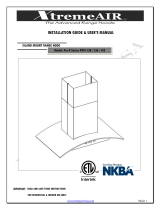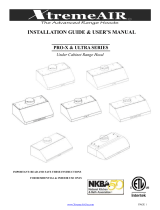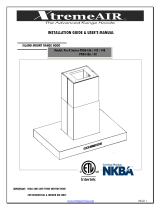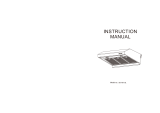
www.XtremeAirUsa.com PAGE 2
IMPORTANT NOTICE: The Important Safety Instructions and warnings in this manual are not meant to cover all possible problems and/or situations that can
occur upon installation of this unit. Use extreme caution when installing, maintaining or operating this or any other appliance. Contact the XtremeAir USA, LLC,
Customer Support Team at 1.714.554.9000 or email: support@XtremeAirUsa.com with any concerns or situations that you do not understand. The
manufacturer disclaims all liability for any damage or injury caused as a result of not following instructions for installation contained
in this manual.
To avoid the possibility of an explosion or fire, do not store or use combustible, flammable or explosive vapors and liquids (such as gasoline) inside or in the
vicinity of this or any other appliance. Keep all combustible items (such as aerosol cans) away from cook top burners, ovens and range hoods. Do not store
flammable or explosive materials in adjacent cabinets or surrounding areas.
Disclaimer
: The manufacturer and/or distributor/reseller decline all responsibility in the event of failure to observe the instructions provided for installation,
maintenance and suitable use of the product. The manufacturer and/or distributor/reseller shall NOT be responsible for any injury due to negligence and the
warranty of the unit shall automatically be voided due to failure to observe proper safety and installation procedures. The manufacturer and/or
distributor/reseller will not be held responsible for any damages to personal property or real estate or any bodily injuries whether caused directly or indirectly
by the range hood.
WARNING - TO REDUCE THE RISK OF FIRE, ELECTRIC SHOCK, OR INJURY TO PERSONS, OBSERVE THE FOLLOWING:
*Use this unit only in the manner intended by the manufacturer. If you have questions, contact the manufacturer.
PRODUCT: Do not remove permanently affixed labels, warnings or plates from the product. This may void the warranty. Do not try to alter the hood.
INSTALLATION: The installation in this manual is intended for qualified installers, service technicians or persons with a similar qualified background. Installation
and electrical wiring must be provided by qualified professionals and in accordance with all applicable codes and standards, including fire-related construction.
When cutting or drilling into the wall or ceiling; do not damage electrical wiring and other utilities. It is recommended that two or more people assist with the
installation. The range hood may have very sharp edges; please wear protective gloves if it is necessary to remove any parts for installing, cleaning or
servicing.
VENTING: For kitchen range or cook top ventilating use only. DO NOT use units to exhaust hazardous or explosive materials and vapors. Ducted fans MUST
always be vented to the outdoors. DO NOT vent exhaust into spaces between walls, crawl spaces, ceiling, attics and/or garages. Use only metal ductwork. Old
duct work should be cleaned or replaced if necessary to avoid the possibility grease fires. Check all joints on ductwork to insure proper connections. All joints
should be properly taped.
ELECTRICAL: All electrical wiring must be properly installed, insulated and grounded. TURN POWER OFF and un-plug cords from outlet before servicing and/
or cleaning to insure your safety.
OPERATION: Caution is suggested when using high settings on cooking range. Keep all fan, baffle, spaces, filter, grease tunnel, oil container and grease-
laden surfaces clean. Grease should not be allowed to accumulate on fan, baffle, spaces, filter, grease tunnel, and oil container. Never allow the filters to
become blocked or clogged. Do not allow foreign objects such as cigarettes and/or napkins, to be absorbed into the hood. Clean ventilating fans frequently.
Grease should not be allowed to accumulate on the fan or filters.
1. IMPORTANT SAFETY INSTRUCTIONS
1 IMPORTANT SAFETY INSTRUCTIONS ......................................................................................................................... 2
2 HEIGHT & CLEARANCE ............................................................................................................................................ 3
3 VENTING REQUIREMENT .......................................................................................................................................... 3
4 VENTING METHODS ................................................................................................................................................. 3
5 ELECTRICAL REQUIREMENT ...................................................................................................................................... 3
6 TOOLS YOU WILL NEED ............................................................................................................................................. 3
7 PARTS SUPPLIED ...................................................................................................................................................... 4
8 DIMENSIONS ........................................................................................................................................................... 4
9 INSTALLATION ......................................................................................................................................................... 4-5
10 RANGE HOOD OPERATION ........................................................................................................................................ 6
11 SPECIFICATION ........................................................................................................................................................ 6
12 TROUBLE SHOOTING ................................................................................................................................................ 6-7
13 USE & CARE INFORMATION ...................................................................................................................................... 7
14 MAINTENANCE ........................................................................................................................................................ 7
15 PRODUCT WARRANTY .............................................................................................................................................. 8
















